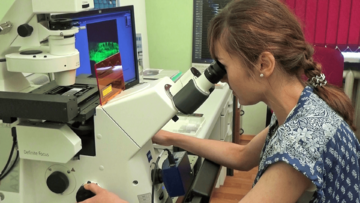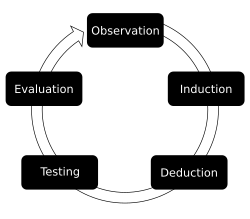Empirical research facts for kids
Empirical research is a way of finding answers by using facts and observations. It's about learning things by watching, experiencing, or collecting information directly. This information, called empirical evidence, can be numbers (quantitative) or descriptions (qualitative).
Researchers use this evidence (often called 'data') to answer specific questions. These questions must be clear and answerable with the data they collect. How research is done depends on the topic and the question. Often, scientists mix both number-based and description-based methods. This is especially true when studying people or education, as these topics are hard to study in a lab.
Sometimes, research starts with a question, like "Does listening to music while studying affect how well you remember words?" Researchers usually have an idea or a theory about the topic. Based on this theory, they make guesses called hypotheses. For example, a hypothesis might be: "Listening to music makes it harder to learn new words." From this, they predict what will happen in an experiment. For instance: "People who study with music will remember fewer words than those who study in silence." They then test this prediction with an experiment. The results help them decide if their theory is supported, needs changes, or should be tested more.
Contents
What Does 'Empirical' Mean?
The word "empirical" first described ancient Greek doctors. These doctors preferred to rely on what they saw and experienced, rather than just old beliefs. Later, empiricism became a way of thinking in philosophy. It meant that knowledge comes from experience and evidence gathered through our senses.
In science, "empirical" means gathering data using only things we can observe. This might be with our senses or with special scientific tools. Both early philosophers and modern scientists agree: empirical work depends on observable facts. These facts help them create and test theories, leading to conclusions.
How Researchers Use Empirical Methods
Researchers try to accurately describe what happens when they observe something. This could be using their own senses or with special tools. If tools are used, the researcher must first check them. They do this by testing the tools on things they already know about. This makes sure the tools are working correctly before they are used on unknown things.
Collecting evidence for or against an idea involves careful research design. This means planning how to collect the empirical data. Good planning is very important for judging if the research is strong. Experts like Campbell and Stanley helped make popular different types of research designs. They talked about pre-experimental, experimental, and quasi-experimental designs. They strongly believed that random experiments are key in educational research.
Empirical Research in Science
In scientific studies, it's very important to analyze data correctly. This is done using standard statistical methods. These methods help decide if empirical research is valid. Statistical tools like regression, t-tests, and ANOVA help researchers draw logical conclusions. If the data shows a significant result using the right statistical method, it means the research hypothesis is supported. If not, it means no effect was seen from the things being tested.
The results of empirical research using statistical tests are never "proof." They can only support a hypothesis, reject it, or do neither. These methods only give probabilities. Among scientists, empirical evidence (different from empirical research) means facts that appear the same to everyone. For example, a thermometer will show the same temperature to anyone who looks at it. The temperature, measured by a good, calibrated thermometer, is empirical evidence.
On the other hand, non-empirical evidence is subjective. This means it depends on the person observing. For example, one person might say a room is warm, while another says it's cool, even if they see the same thermometer reading. Using empirical evidence helps avoid these personal differences.
Scientists who believe in empiricism think that all knowledge comes from experience. This experience is gained through our five senses or by thinking about what we've sensed. However, some thinkers, called rationalists, believe we are born with some knowledge already. They think that some ideas or knowledge can exist without needing direct experience.
The Empirical Cycle
A.D. de Groot created a helpful way to understand empirical research. It's called the empirical cycle and has five steps:
- Observation: This is when you notice something interesting and start asking why it happens.
- Induction: Next, you come up with a general idea or hypotheses to explain what you observed.
- Deduction: Then, you plan experiments to test your idea. These experiments should show if your idea is true or false.
- Testing: This is where you carry out the experiments and collect your data.
- Evaluation: Finally, you look at your data and figure out what it means. You then form a theory that best explains your observations and experiment results.
See also
 | Madam C. J. Walker |
 | Janet Emerson Bashen |
 | Annie Turnbo Malone |
 | Maggie L. Walker |



